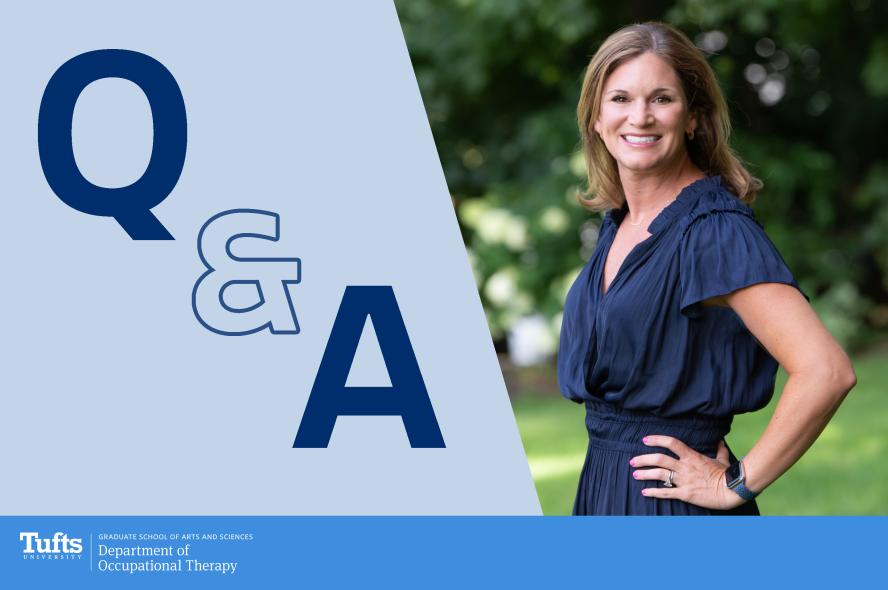Q&A: Admissions Tips with Admissions Coordinator Jill Rocca, OTD ‘08

By: Maisie O'Brien
1) Why should someone study occupational therapy?
Occupational therapy is a great field for so many reasons. First, you can do so many things with an OT degree. You can work with essentially any population from pediatrics to seniors, and in a variety of settings, like traditional rehab, community-based settings, educational settings, and mental health settings. OTs are also branching out into emerging and non-traditional settings, such as roles within prisons, businesses, and advocacy organizations. A wide variety of backgrounds are helpful in the field of OT. Many of our students enter the program with a background in health and science, but experience in the arts, business, or athletics is also very useful. With OT, you can really carve out a fulfilling career that channels your interests and passions.
Personally, I love being an occupational therapist because we have the opportunity to work with clients in a very close, client-centered way. We get to learn about their lives, hopes, dreams, interests, and families. We get to see what makes them tick and help them achieve their goals to enhance their health and well-being. OTs tend to be nurturers. When I was working in a community health setting, I’d come home brimming over and so happy because I saw so much progress in my clients. We’re able to help people in many different areas of their lives - it’s deeply fulfilling work.
2) What qualities or experience does the Tufts Occupational Therapy Department look for in prospective applicants? What makes an application stand out?
I’ve been working in admissions in the Tufts Occupational Therapy Department for over 15 years now, and I can say we’ve always looked at applications holistically. We’re looking at students’ academic backgrounds, work and lived experiences, and knowledge of the field to ensure we create a class of students who can learn with and from each other. In terms of academics, I always tell prospective students who are concerned that their undergraduate grades aren’t perfect not to worry too much about that. You can’t go back and change what’s behind you. We need to know that you’ll succeed academically in our program, but we also take into account your work and volunteer experiences, knowledge of the field, and motivation for becoming an OT.
The personal essay and writing components are really where our applicants can stand out. We’re looking for reflection and introspection, not a recounting of your resume. It could touch on your personal and professional experiences and how they have informed your decision to study OT. It could describe your personal experiences with the field or any “Ah ha” moments you’ve experienced with clients while shadowing occupational therapists or working in similar settings. This year, we’re also using a tool called Kira to collect video responses from our applicants. Similar to the essay portion, we’re not looking for perfect, scripted answers or a rehashing of your resume. We’re trying to get a sense of what motivates you, your life stories, and why you’re drawn to the field.
We require incoming students to complete shadowing hours, ideally in a few different OT settings. This requirement is more for the benefit of our students than for our Admissions Team. Graduate school is a major commitment and we want to ensure that the folks entering our program are certain that this will be a fulfilling lifelong career for them. We don’t require a specific number of shadowing hours, but it would be more or less depending on your exposure to OT. So, if you or a family member have received OT services, then you will likely have a better sense of what OT is than someone with no direct experience with it.
3) What makes the Tufts Occupational Therapy Department special or unique? What do new students find surprising about the program?
All occupational therapy schools follow a standardized national curriculum, including Tufts. OT programs vary in terms of how they deliver that curriculum, so the way our program is designed is we start off with foundational courses, which build upon each other like building blocks. I think our faculty does an excellent job of threading the content of our courses together, giving our students a really comprehensive understanding of OT methods and practices. We have a very strong graduation rate and passing rate on the national board exams.
One thing that makes the Tufts Occupational Therapy Department particularly unique is that we’re a part of the Graduate School of Arts and Sciences. While many OT programs are grounded in the medical model, our program has more of a liberal arts feel to it. We’re a bit more holistic, client-centered, and focused on thinking outside the box. While we provide plenty of instruction in traditional rehabilitation and the sciences, we also have an emphasis on nontraditional and emerging areas of practice. When our students graduate, they’re creative problem solvers ready to work in any area of the profession and many go on to assume leadership roles within the field.
One thing our students repeatedly tell me that surprises them about the program is how supportive it is. Our students aren’t particularly competitive with each other; it’s more that they’re rooting for each other to succeed. I’ve heard of other OT programs that have a competitive feel to them, but our program feels really warm and close-knit. No one is expecting you to be perfect. Our faculty really encourage students to develop a growth mindset, learn from their failures, and understand that learning is a lifelong process. And once you join the Tufts OT Department, you’re a part of this fantastic community forever. Alums are always welcome to reach out to me, their professors, and their peers for resources and support. I’m a great example of this. I started working in the department when I graduated because I loved the atmosphere and I didn’t want to leave. They can’t get rid of me!